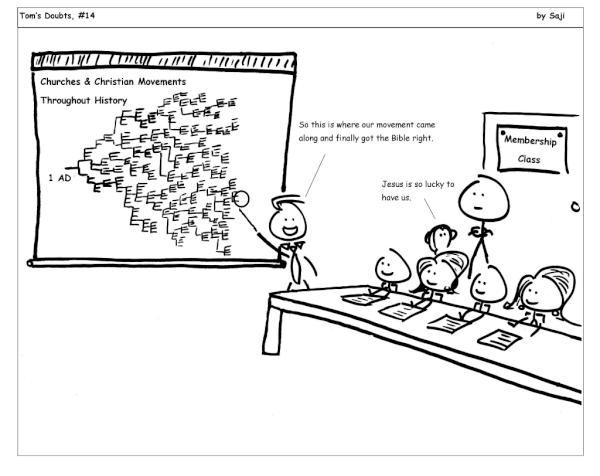This article was imported from our previous website, which many have broken some of the content. We apologize in advance for any strange formatting or broken links you may find.

If there is anything that has become apparent in the latest national and political season, it is that we are a divided nation, politically and racially.
If you don’t trust me, just get on Facebook. Geez. The infighting, the name-calling – the distrust is clear. How are we supposed to change our neighborhood, city, nation or world if we think everyone else is the problem?
As we look for solutions, you would think the church of Jesus Christ would be an example of civility and unity, but sadly it isn’t.
Recent research shows 86% of congregations are made up of one predominant racial group. That may not be surprising, but what was to me is that most churchgoers were content with the ethnic status quo in an increasingly diverse world. We are fine being with people who are like us and who like us.[1]
All this has left me searching for understanding, searching for hope. What does Scripture say about unity, and what can be done to begin to work toward a new future?
This led me to one of Jesus’ last prayers recorded before He left:
“I do not ask for these only, but also for those who will believe in me through their word, that they may all be one, just as you, Father, are in me, and I in you, that they also may be in us, so that the world may believe that you have sent me. The glory that you have given me I have given to them, that they may be one even as we are one, I in them and you in me, that they may become perfectly one, so that the world may know that you sent me and loved them even as you loved me.” - John 17:20-23 (emphasis added)
What was Jesus’ prayer for the church? Unity.
Jesus knew the human soul. He knew humans naturally create groups so we can determine who is in and who is out, because we like people who are like us and who like us.
He cautioned us to watch our language, to watch out for the patterns and the division that would arise from all those who would proclaim the name of Jesus as Lord and Savior.
What I have come to realize in my work as a pastor in a church, and now with multiple churches in our city, is we are quick to dismiss the authentic faith of those who are different than us, even when we may not explicitly say it.
If we are from a small urban church, we write off the large mega church in the suburbs. If we are an expressive Pentecostal church that believes in speaking in tongues during worship, we look down on the conservative Baptist who barely claps. Non-denoms dismiss the out-of-date methodology of liturgical churches. Young vs. old, black vs. white vs. Hispanic, and on and on and on… We are good at dividing on race, gender, practice or any theological issue. If you are not like us, you are not with us.
This is not unity.
The church is called to be agents of reconciliation and unity in a divided world (2 Corinthians 5).
I believe there are two key things we can begin doing to fight the growing tide of distrust and division: practicing humility and using more inclusive language.
- Humility
Paul reminds us that if we are to seek unity, it must start with humility:
For by the grace given to me I say to everyone among you not to think of himself more highly than he ought to think, but to think with sober judgment, each according to the measure of faith that God has assigned. For as in one body we have many members, and the members do not all have the same function, so we, though many, are one body in Christ, and individually members one of another. - 1 Corinthians 12:3-5 (emphasis added)
If we recognize that we as individuals and the church do not always have THE right perspective, all THE skills, THE best of anything, we will recognize that we are desperately dependent on other Christians and other churches to do the work of reaching the world for Christ. [2]

We all have various functions, and though there can be strong disagreements, we are under the same banner of Christ, so fostering yourself as a learner, recognizing you have something to gain from a brother or sister in Christ who sees things from a different perspective than you, is not only a necessity to move His kingdom agenda forward in this world, but a mandate of Jesus.
- More Inclusive Language
I believe the second thing we should adopt as the church is a more inclusive language. I just finished Christena Cleveland’s solid book called, Disunity in Christ: Uncovering the Hidden Forces That Keep Us Apart, and what she advocates over and over, based on research and social psychology, is that when we use “us and them” language, we are more likely to distrust and not believe the best of the “other.”
Christena says, "We need to adopt the belief that to be a follower of Christ means to allow our identity as members of the body of Christ to trump all other identities. We need to adopt the belief that to be a follower of Christ means to put our commitment to the body of Christ above our own identity and self-esteem needs. We’ve coped with our divisions long enough. It’s time for us to discover our true identities as members of the family of God. It’s time for us to rally around this identity, overcome our divisions and change the world. In sum, it’s time for us to change the way we see ourselves."[3]
Media, politics and sometimes even religion are built on dividing people into easily segmented groups. Jesus was not divisive. Jesus was so inclusive it shocked the religious elite. Jesus did not let go of His theology to work with someone with a different perspective. In fact, His understanding of God motivated Him to do it.
Resist the temptation to divide. Start with humility by recognizing your perspective, theology and skills make you who you are, but that you need other perspectives, other theologies and other skills.
Secondly, catch yourself as you refer to other Christians as “those people.” We all have a crazy uncle in our family tree. Shoot, you may be someone else’s crazy uncle. Language matters. Be more inclusive as you talk about the family of God and the church He has created.
These are radical practices in our time, but our world is desperate for this time of love and unity. As Jesus said, “so that the world may know…"
Lord, help us practice the unity you lived and desire for your church. Amen.
[1] Ed Stetzer with Bryan Loritts, “The Most Segregated Hour of the Week?” Christianity Today. 2015.
[2] The cartoon Tom's Doubts, #14 pic.twitter.com/joxLzUI — Saji George (@S_A_J_I) September 3, 2011.
[3] Christena Cleveland, Disunity in Christ: Uncovering the Hidden Forces That Keep Us Apart. IVP Books. 2013.